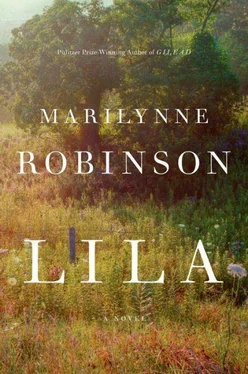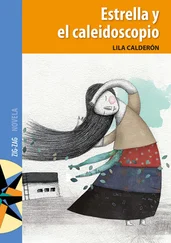I have worried that you might think I did not take your question as seriously as I should have. I realize I have always believed there is a great Providence that, so to speak, waits ahead of us. A father holds out his hands to a child who is learning to walk, and he comforts the child with words and draws it toward him, but he lets the child feel the risk it is taking, and lets it choose its own courage and the certainty of love and comfort when he reaches his father over — I was going to say choose it over safety, but there is no safety. And there is no choice, either, because it is in the nature of the child to walk. As it is to want the attention and encouragement of the father. And the promise of comfort. Which it is in the nature of the father to give. I feel it would be presumptuous of me to describe the ways of God. Those that are all we know of Him, when there is so much we don’t know. Though we are told to call Him Father. And I know it would be presumptuous to speak as if the suffering that people feel as they pass through the world were not grave enough to make your question much more powerful than any answer I could offer. My faith tells me that God shared poverty, suffering, and death with human beings, which can only mean that such things are full of dignity and meaning, even though to believe this makes a great demand on one’s faith, and to act as if this were true in any way we understand is to be ridiculous. It is ridiculous also to act as if it were not absolutely and essentially true all the same. Even though we are to do everything we can to put an end to poverty and suffering.
I have struggled with this my whole life.
I still have not answered your question, I know, but thank you for asking it. I may be learning something from the attempt.
Sincerely,
John Ames
Well, he forgot he was writing to an ignorant woman. She’d have hated him for remembering. Still, she’d have to study this a little. A letter written to her. Lila, if I may.
Then what was she supposed to do? Write him a letter? She’d shame herself. Those big, ugly words on a piece of tablet paper, nothing spelled right. But then she’d shamed herself before and he never seemed to mind. Planting her spuds in his flower garden. Knocking at his door before the sun was well up to ask him her one question. Throwing her arms around him. Taking off with his sweater. It should have pained her to remember, but every time she rested her head on that old sweater she was just glad for it all. She had even thought about putting it in the fire, because it worried her how it kept him on her mind. Then maybe she could catch that bus. She certainly did wonder about herself. He should be thinking she’s crazy for sure by now. No sign of it in that letter, though. She thought, How can he forget what I am?
But she hadn’t yet put things right with those people who gave her the chicken. She could spend the morning there and then go down to the river and wash out some of her clothes. She’d better get started. Doane used to say that if you start after sunrise, you’ve wasted the day. The woman was still just as sickly, so Lila cleaned house for a while and then she chopped weeds for a while in the kitchen garden, and then, when no one was looking, she put the hoe in the shed and walked away. Now they were even.
She liked to do her wash. Sometimes fish rose for the bubbles. The smell of the soap was a little sharp, like the smell of the river. In that water you could rinse things clean. It might be a little brown after a good rain, soil from the fields, but the silt washed away or settled out. Her shirts and her dress looked to her like creatures that never wanted to be born, the way they wilted into themselves, sinking under the water as if they only wanted to be left there, maybe to find some deeper, darker pool. And when she lifted them out, held them up by their shoulders, they looked like pure weariness and regret. Like her own flayed skin. But when she hung them over a line and let the water run out, and the sun and the wind dry them, they began to seem like things that could live. At the church once they read the story about how the Queen of Egypt came down to a river and found a baby floating in a basket, and after that it was her baby. Live. The mother was supposed to kill the child, but she couldn’t. She put it in the river, and the queen lifted it out. But then it grew up and turned into a man, and he decided he didn’t want to be her child. Or maybe she had died, and her father didn’t take to him, but that’s not in the story. Well, Lila thought, I hope she did die before he could treat her that way. She should have been able to trust him. Here I am thinking that way again. Can’t trust nobody. That’s what I’m thinking all the time. If I’m ever going to try it, it might as well be now, when I can leave if I have to and I’m still young enough to get by for a while. When it won’t much matter if it don’t work out.
So.
She’d get herself together as well as she could, walk to the church, to that little room where people came when they wanted to talk to him, and she’d knock on the door. And then she would say to him that she did want to get baptized after all and she was sorry she forgot to come to them classes. Then he’d say something. She would tell him that was a real nice letter. He’d say something else. And what would any of it amount to? She saw them all talking to each other all the time. Laughing. Doll used to say, “No cussing!” and they would laugh because of all the things they knew and nobody else did. But if you’re just a stranger to everybody on earth, then that’s what you are and there’s no end to it. You don’t know the words to say.
She went to Mrs. Graham’s to see if she needed help with the ironing, and she did. That took the morning and most of the afternoon. She wanted some things from the store, so she had to walk past the church. He was out in front of it, with his hands on his hips, looking up at the roof. But he turned and saw her and said, “Good afternoon.” She nodded and kept on walking. He caught up with her and fell into step beside her, a little out of breath. He said, “I’m glad to see you.”
“Why?”
He laughed. “Well, that’s what people say sometimes. Besides, I am glad to see you.”
They walked on like that, right past the store. She said, “Why?”
He laughed again. “You ask such interesting questions.”
“And you don’t answer ’em.” He nodded. It felt very good to have him walking beside her. Good like rest and quiet, like something you could live without but you needed anyway. That you had to learn how to miss, and then you’d never stop missing it. “I quit coming to them classes. So I guess I don’t get baptized.”
“Yes, I’ve given that some thought. There are things we do hope the person being baptized will understand well enough to affirm.”
“Affirm? I don’t even know that word. I can’t half understand that letter you give me. I’m an ignorant woman. Seems like you can’t understand that .”
He stopped, so she did. He looked into her face. “I think I would understand it if it were true. But I don’t believe it is. So I don’t see the point in acting as if I do.” He shrugged. “Knowing a few words more or less—”
“It ain’t that simple.”
He nodded. “It isn’t the least bit simple. But if you are at church this Sunday and you want to accept baptism, then — I will do it with perfect confidence in the rightness of it. That’s all I can say.”
She said, “I got to get some things at the store.” So they turned and walked back into Gilead.
He said, “I suppose you still don’t trust me at all.”
“I just don’t go around trusting people. Don’t see the need.” They walked on a while.
Читать дальше












